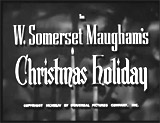
|
Christmas Holiday (1944)
In Richard Siodmak's little-known, melodramatic film
noir (with a misleading title) about doomed and lost love and redemption
(with a script by Herman Mankiewicz - noted for its two long flashback
sequences); the film was based on W. Somerset Maugham's 1939 novel,
and unusual for the against-type casting of precocious 'good girl
next door' singer Deanna Durbin as a femme fatale prostitute:
- the dual character of Jackie Lamont (Deanna Durbin),
a lounge singer - "hostess" in a New Orleans nightclub-bordello
known as Maison Lafitte (a "joint" located out of town)
- the immediate romantic interest shown by recently-jilted
and stranded Army Lt. Charles Mason (Dean Harens), who was in the
club and drawn to the sultry yet doeful strumpet-singer with a V-neckline
who asked him to dance
- and their attendance at a midnight Christmas mass
at St. Louis Cathedral, when the depressed girl broke down inconsolably,
and hysterically cried about her woeful life
- after the service, Jackie and Mason ate a meal at
an all-night diner-eatery ("Morning Call Coffee Stand")
at the bus station; at the start of a flashbacked set of sequences
(at the diner and the next morning in his hotel room), she told him
that she had been known as Abigail Martin in her previous life (transplanted
from Vermont at the age of 16), when she married no-good, irresponsible,
jealous, lying, gambling-addicted, 'mother-fixated' (homosexual?)
scoundrel Robert Mannette (Gene Kelly, also cast against type) with
a domineering, manipulative, menacing and semi-incestuous mother
Mrs. Mannette (Gale Sondergaard) - he was in a "pathological" relationship
with her according to a psychoanalyst
- in the flashback, their courtship and first few months
of marriage were idyllic, but he suffered a quick downfall in their
sixth month, and was now serving a life sentence at Angola Prison
for the murder of his book-maker Teddy Jordan (Mannette's long murder
trial was the subject of another flashback); Robert's mother had
burned his blood-stained incriminating pair of trousers and there
was a cover-up of the theft of money
- according to Mrs. Mannette in a denunciatory speech,
she had allowed Abigail to marry her son to reform him, but accused
her of failing in that task: "He needed your strength. That's
why I let him marry you. And all you gave him back was his own weakness...You
should have known. You weren't blind because you had to be. You wanted
to be. It might have hurt to know that Robert is what he is. But
if you had been willing to hurt for his sake, you could have helped
him...It's I who love him because I'm willing to know all about him
and keep on loving him. But you! I tried to make him strong
myself. I couldn't alone so I relied on you. You have failed!";
after the trial and guilty verdict, Mrs. Mannette strutted out of
the courtroom with Abigail, curtly spoke: "You killed him!",
and slapped the startled Abigail across the face
- however, Abigail continued to steadfastly stand by
Robert Mannette, naively love him and show loyalty to him, even after
his conviction - questioned by a skeptical Lt. Mason at the end of
the flashback: ("I guess maybe there's some other meaning to
love than, than what I was taught")
- according to newspaper headlines, Mannette broke
out from prison (after only a few years of incarceration), and began
looking for Abigail; he met up with her in the nightclub's backroom
in the final scene; she suggested escaping with him and that she
still loved him: ("I love you, Robert...There hasn't been a
second I didn't love you....There's only one reason why I've been
working here, only one. When it was all over, the trial and everything,
I saw that your mother was right. I should have kept you from the
things you were doing. I was just as much to blame as anybody. I
can still hear them call you guilty. Guilty, guilty, and every time
they said it, I knew it was meant for me too. I wanted to die, but
you were in prison alive, that's why I had to live like you, to suffer
like you. People I met here had nothing but contempt for me. That's
what I wanted. This is my prison, Robert, but I'm not as strong as
you are. I can't break out without you. I need you. I've been holding
on to you all the time. I love you"), but he still accused her
of being cheap and unfaithful to him while working at the club
- a policeman tracked footprints to the room's half-opened
window, and shot Mannette dead with one bullet; he quickly died in
Abigail's arms (as he whispered to her: "You can let go now,
Abigail")
|
Lt. Charles Mason: "You Can Let Go Now, Abigail"
|
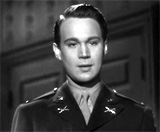
|

|
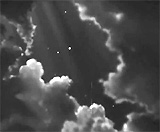
|
- the majestic end shot as she stared into the clouds
of the heavenly, clearing night sky with a tearful backlit face,
to the tune of Wagner's 'Liebestod'; in the film's last line of
dialogue, Mason reminded Abigail: "You heard what Mannette
had said. 'You can let go now, Abigail'"
|
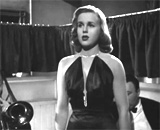
Lounge Singer Jackie Lamont
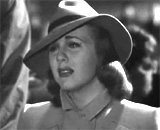
Jackie's Breakdown in Cathedral
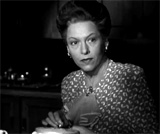
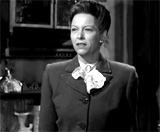
Mrs. Mannette
(Gale Sondergaard)
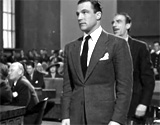
Court Trial of Robert Mannette
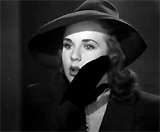
Mrs. Mannette's Slap Across Jackie's/Abigail's Face After
Mannette's Trial
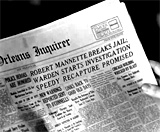
Mannette's Jail Break
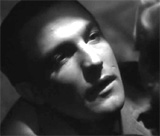
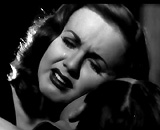
Death of Mannette in Abigail's Arms
|










